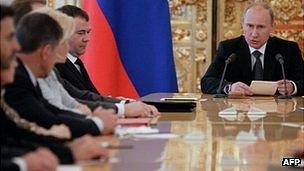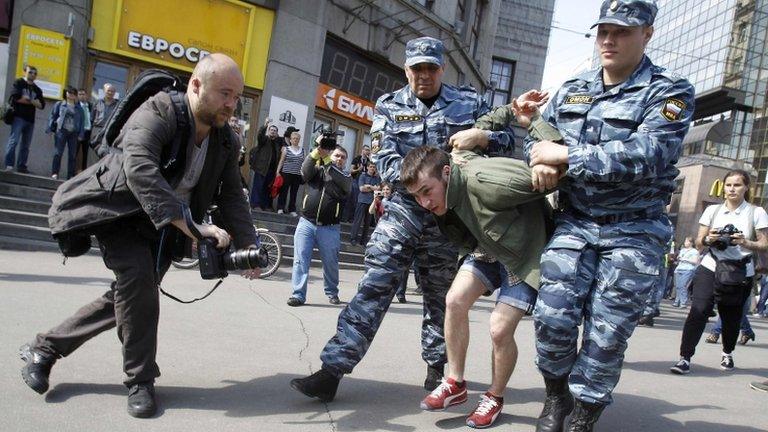Russian parliament adopts NGO 'foreign agents' bill
- Published

President Putin has accused Western powers of manipulating some Russian NGOs for political ends
Russia's lower house of parliament has adopted a controversial bill that labels foreign-funded non-governmental organisations as "foreign agents".
The upper house and President Vladimir Putin are now expected to turn the bill into law.
Approval in the largely pro-Putin Duma (lower house) was overwhelming.
Human rights activists have condemned the bill, seeing it as a tool to crush dissent. The Duma also voted to impose big fines for libel or slander.
Journalists from some leading Russian news outlets demonstrated outside the Duma against the new libel law, which envisages fines of up to 5m rubles (£99,000; $153,000) for offenders. They warned that it would bring extra pressure on the media.
The NGO bill requires all the relevant NGOs' materials to include the phrase "foreign agents". The term carries a Soviet-era negative taint in Russia, suggesting spying, correspondents say.
The Kremlin says the bill is needed to protect Russia from outside attempts to influence internal politics.
Some NGOs complain that they have to seek funding from abroad because they cannot get it from the Russian state. There are also fears that the bill could be used to restrict independent election monitoring.
Prime Minister Dmitry Medvedev said state funding would be increased for NGOs whose activity "as a whole is deemed useful and positive for our country".
Under the bill, foreign-funded NGOs involved in politics will also have to undergo financial audits and issue twice-yearly reports on their activities.
Failure to comply will be punishable by heavy fines or even a two-year prison sentence.
- Published13 July 2012

- Published25 March 2024

- Published22 May 2012

- Published12 June 2012

- Published5 March 2012
